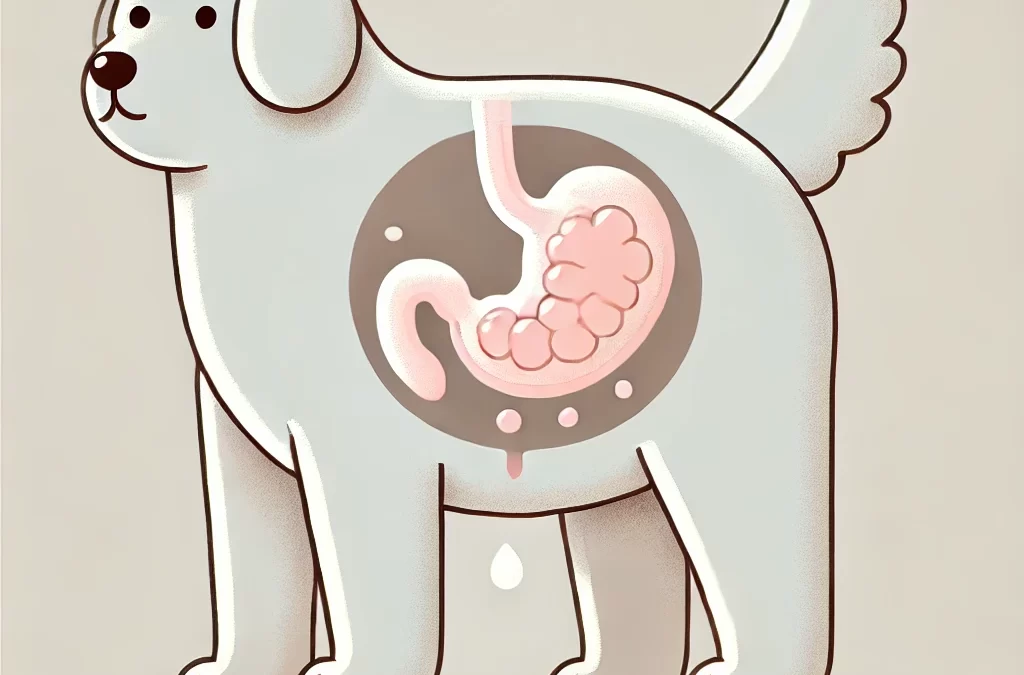
by TCMVET | Dec 7, 2024 | Dog Cancer & Tumors
Transitional Cell Carcinoma (TCC) is the most common type of urinary bladder cancer in dogs, often presenting significant challenges for both pets and their owners. Despite its aggressive nature, early detection and a proactive approach to treatment can help improve a dog’s quality of life.
What is Transitional Cell Carcinoma?
TCC is a malignant cancer that typically originates in the epithelial lining of the bladder, particularly in the trigone area, where the urethra and ureters meet. Although it primarily affects the bladder, it can spread to the urethra, prostate, lymph nodes, and other organs if left untreated.
Which Dogs are at Risk?
While TCC can affect any dog, certain breeds are predisposed, including:
- Scottish Terriers (highest risk)
- Shetland Sheepdogs
- West Highland White Terriers
- Beagles
Female dogs and older dogs are more likely to develop TCC, though the condition is not exclusive to these groups.
Symptoms to Watch For
Early signs of TCC can resemble common urinary tract infections, which makes diagnosis tricky. Key symptoms include:
- Straining to urinate (dysuria)
- Increased frequency of urination (pollakiuria)
- Blood in the urine (hematuria)
- Urinary incontinence
- Difficulty passing urine or complete blockage
As the disease progresses, symptoms such as lethargy, weight loss, and abdominal pain may emerge.
How is TCC Diagnosed?
Diagnosing TCC requires a combination of tests to rule out other conditions and confirm the presence of cancer:
- Urinalysis: Helps detect blood, bacteria, or abnormal cells.
- Imaging: Ultrasound or X-rays can reveal bladder masses.
- Cystoscopy: Direct visualization of the bladder for biopsy collection.
- BRAF Mutation Test: A non-invasive urine test that detects mutations associated with TCC.
Early and accurate diagnosis is critical to implementing an effective treatment plan.
Treatment Options
While TCC is rarely curable, various treatments can manage the disease and improve the dog’s quality of life:
- Medications:
- Non-Steroidal Anti-Inflammatory Drugs (NSAIDs) such as piroxicam are often prescribed for their anti-cancer properties.
- Chemotherapeutic agents like mitoxantrone or vinblastine may be used alone or in combination with NSAIDs.
- Surgery:
- Surgical removal of the tumor is an option if it is localized, but the tumor’s location in the trigone area often makes this difficult.
- Radiation Therapy:
- Can help shrink tumors and alleviate symptoms when surgery is not feasible.
- Palliative Care:
- Focuses on maintaining comfort through pain management and addressing urinary obstructions.
Living with TCC: What Owners Should Know
Managing a dog with TCC involves regular veterinary check-ups and monitoring for symptoms. Here are some tips for pet owners:
- Diet and Hydration: Provide a balanced diet and ensure the dog stays hydrated to support urinary health.
- Medications: Administer prescribed drugs consistently and report any side effects to your vet.
- Observation: Watch for changes in urination patterns or signs of discomfort.
- Emotional Support: TCC can be stressful for both the pet and the owner, so seek support from your vet or pet communities.
Prognosis
The prognosis for dogs with TCC varies depending on the stage of the disease and the treatment plan. With appropriate care, many dogs can live comfortably for months or even over a year post-diagnosis. Early detection and a proactive approach can make a significant difference in extending a dog’s life and maintaining their quality of life.
Final Thoughts
While transitional cell carcinoma is a serious diagnosis, advancements in veterinary medicine provide hope and options for pet owners. By understanding the disease and working closely with your veterinarian, you can ensure your dog receives the best care possible.

by TCMVET | Dec 7, 2024 | Dog Cancer & Tumors
Discovering a large abdominal mass in a dog can be alarming for any pet owner. While it is natural to worry, understanding the potential causes, symptoms, and treatment options can empower you to make informed decisions about your dog’s health.
What is an Abdominal Mass?
An abdominal mass is an abnormal growth in the stomach area that may arise from organs such as the liver, spleen, intestines, or even surrounding tissues. These masses can vary significantly in size and may be benign (non-cancerous) or malignant (cancerous).
Common Causes of Abdominal Masses
- Benign Growths
- Lipomas: Fatty tumors that are generally harmless.
- Cysts: Fluid-filled sacs that may grow over time but are typically non-threatening.
- Malignant Tumors
- Hemangiosarcoma: A common cancer affecting the spleen.
- Lymphoma: Affects lymph nodes and can spread to the abdomen.
- Carcinomas: Tumors arising from epithelial tissues of internal organs.
- Other Causes
- Abscesses: Infections that lead to pus-filled pockets.
- Organ Enlargement: Conditions like liver disease can mimic mass growth.
Symptoms to Watch For
Early detection can significantly impact outcomes. Look for:
- Swollen or distended abdomen
- Weight loss or reduced appetite
- Vomiting or diarrhea
- Lethargy or signs of discomfort
- Difficulty breathing due to abdominal pressure
Diagnosis
Diagnosing an abdominal mass requires a veterinarian’s expertise. Procedures may include:
- Physical Examination: Palpating the abdomen to detect unusual growths
- Imaging Tests: Ultrasound or X-rays to determine the size, location, and nature of the mass
- Biopsy or Fine Needle Aspiration: Collecting tissue samples for analysis
- Blood Tests: Checking for related health conditions
Treatment Options
The treatment depends on the mass’s type and location:
- Surgical Removal: Often the first line of action for operable masses
- Chemotherapy or Radiation: Used for malignant growths, especially if surgery isn’t possible
- Palliative Care: Focuses on maintaining comfort if the condition is untreatable
Proactive Steps for Pet Owners
- Routine Check-ups: Regular veterinary visits can help catch problems early
- Monitor Symptoms: Keep an eye on any changes in your dog’s behavior or appetite
- Proper Nutrition: A balanced diet supports overall health and recovery
- Second Opinions: Don’t hesitate to consult another vet for complex cases
Large abdominal masses in dogs are a serious concern, but with timely veterinary care and proper management, many dogs can achieve good outcomes. Always work closely with your vet to determine the best course of action for your furry friend.

by TCMVET | Dec 6, 2024 | Dog Cancer & Tumors
When a beloved pet is diagnosed with cancer, it can be a challenging journey for any pet owner. Exploring the right treatment options and supplements becomes crucial in ensuring their comfort and quality of life. Among the myriad of pet cancer supplements available online, TCMVET Baituxiao stands out as a natural, effective option designed to help manage and combat tumor growth in dogs and cats.
Understanding the Role of Cancer Supplements in Pet Care
Cancer in pets often leads to physical discomfort, reduced energy levels, and decreased immunity. While conventional treatments like surgery, chemotherapy, or radiation can be effective, they are often accompanied by high costs and potential side effects. This is where natural supplements can play a supportive role, aiming to:
- Enhance the immune system.
- Slow tumor growth.
- Improve overall well-being and energy levels.
- Reduce inflammation and discomfort.
By combining traditional therapies with scientifically-backed supplements, you can give your pet the best chance at a healthier and more comfortable life.
What is TCMVET Baituxiao?
TCMVET Baituxiao is a specialized herbal formula rooted in the principles of Traditional Chinese Medicine (TCM). Developed specifically for pets, it leverages the power of natural ingredients to:
- Reduce Tumor Growth: Its unique blend targets abnormal cell proliferation, helping to slow the growth of tumors.
- Support Overall Health: With its immune-boosting properties, it enhances your pet’s natural defenses.
- Ease Symptoms: Baituxiao can reduce inflammation and improve energy, ensuring your pet remains active and happy.
Why Choose TCMVET Baituxiao?
- Natural Ingredients: Free from synthetic additives, Baituxiao uses herbal components that are gentle on your pet’s body.
- Veterinarian-Approved: Many vets support its use as part of an integrative treatment plan for pets with tumors.
- Scientifically Formulated: Combining modern research with TCM expertise, TCMVET Baituxiao is carefully crafted for safety and efficacy.
How to Use TCMVET Baituxiao
Using TCMVET Baituxiao is simple and convenient. It can be administered orally or mixed with food for easy consumption. Dosages are adjusted based on your pet’s size and specific health needs, ensuring optimal results. Always consult your veterinarian before introducing any new supplement to your pet’s routine.
Where to Buy TCMVET Baituxiao Online
You can purchase TCMVET Baituxiao conveniently online through platforms like Amazon, Shopify, or directly from the TCMVET website. With fast shipping options, including fulfillment from Amazon warehouses, you can start your pet’s journey to better health quickly and hassle-free.
Testimonials from Pet Owners
Pet owners who have used TCMVET Baituxiao often share heartwarming success stories. Many have reported noticeable improvements in their pets’ energy levels, reduced tumor sizes, and a higher quality of life.
Tips for Choosing the Right Pet Cancer Supplement
When looking for effective cancer supplements online, consider the following:
- Safety and Ingredients: Opt for products with natural, pet-safe components.
- Reviews and Recommendations: Look for feedback from other pet owners.
- Ease of Administration: Choose supplements that are easy to give to your pet.
- Expert Guidance: Consult your vet to ensure the supplement aligns with your pet’s treatment plan.
Conclusion
Navigating a pet cancer diagnosis is never easy, but with the right tools and supplements like TCMVET Baituxiao, you can provide your pet with comfort, care, and improved well-being. By purchasing effective cancer supplements online, you can take a proactive step in managing your pet’s health journey. Explore TCMVET Baituxiao today and see the difference it can make for your furry friend.

by TCMVET | Dec 6, 2024 | Dog Cancer & Tumors
Ovarian cancer in dogs is a rare and often silent intruder, subtly weaving its way into the lives of our beloved pets. Unlike more common canine cancers, ovarian cancer doesn’t always present overt symptoms in its early stages, making it a challenge for even the most vigilant pet owners to detect. This article dives deep into this under-discussed topic, shedding light on the symptoms and early warning signs that every dog owner should know.
Understanding Ovarian Cancer in Dogs
Ovarian cancer arises from abnormal growth in the ovaries, often in middle-aged or older unspayed females. The condition is rare due to the increasing practice of spaying, which significantly reduces the risk. However, for intact dogs, the danger remains—a silent predator lurking within.
Early Symptoms: The Whisper of Disease
Ovarian cancer symptoms often overlap with other health issues, making early detection tricky. Here are the subtle signs that might hint at a deeper problem:
- Abnormal Heat Cycles
If your dog’s estrus cycles become irregular, prolonged, or unexpectedly cease, it could indicate ovarian abnormalities.
- Enlarged Abdomen
Fluid accumulation (ascites) or a growing tumor may cause noticeable swelling in your dog’s abdomen.
- Behavioral Changes
Lethargy, irritability, or restlessness may signal discomfort or pain caused by internal changes.
- Loss of Appetite and Weight
A lack of interest in food, paired with unexplained weight loss, often serves as an early red flag.
- Discharge or Bleeding
Vaginal discharge, particularly if it is unusual or occurs outside of the typical heat cycle, warrants immediate veterinary attention.
Advanced Symptoms: When Silence Breaks
As ovarian cancer progresses, more noticeable and severe symptoms may arise:
- Difficulty Breathing: This can occur if the cancer metastasizes to the lungs.
- Lameness: A sign of metastasis to the bones.
- Visible Masses: Palpable growths in the abdomen or surrounding areas.
- Severe Lethargy and Weakness: Indicative of systemic spread and declining health.
Diagnosis: The Importance of Early Detection
Ovarian cancer is most effectively diagnosed through a combination of diagnostic imaging (ultrasound or X-rays) and blood tests. A biopsy or fine-needle aspiration of suspicious masses can confirm the presence of cancer. Regular veterinary check-ups, especially for unspayed dogs, are critical for early detection.
Prevention and Spaying: A Lifesaving Step
The single most effective way to prevent ovarian cancer in dogs is spaying. This not only eliminates the risk of ovarian cancer but also reduces the chances of other reproductive cancers and diseases, such as pyometra.
Holistic Care for Canine Cancer
For dogs diagnosed with ovarian cancer, holistic care can complement conventional treatments like surgery, chemotherapy, or radiation. Incorporating anti-inflammatory diets, immune-boosting supplements, and stress-reducing therapies can enhance your pet’s quality of life.
- Herbal Support: Consider supplements like turmeric or milk thistle, known for their anti-inflammatory and detoxifying properties.
- Dietary Adjustments: A high-protein, low-carbohydrate diet may help slow cancer growth.
- Emotional Care: Never underestimate the power of love, attention, and comfort during this challenging time.
The Unwavering Bond
While the diagnosis of ovarian cancer in dogs can be heartbreaking, it also serves as a poignant reminder of the deep bond we share with our furry companions. Every symptom, every sign, and every action we take is a testament to the unconditional love that defines our relationship with them.
By understanding the subtle signs of ovarian cancer and taking proactive measures, we can better protect our canine companions, ensuring they live their happiest, healthiest lives. After all, they deserve nothing less than our very best.

by TCMVET | Dec 5, 2024 | Dog Cancer & Tumors
Abnormal growths in a dog’s lower intestines can cause significant health concerns, ranging from discomfort to life-threatening conditions. These growths, often located in the rectum or colon, can be benign or malignant. Understanding their causes, symptoms, and treatment options is crucial for timely intervention.
Common Types of Growths
- Polyps
- Polyps are benign growths that develop in the lining of the intestines.
- They may cause minor bleeding, diarrhea, or constipation.
- If untreated, polyps can sometimes transform into malignant tumors.
- Adenocarcinoma
- A malignant tumor affecting the glandular cells lining the intestine.
- This is one of the most aggressive types of lower intestinal cancers.
- Early detection is critical for effective treatment.
- Leiomyosarcoma
- A rare type of cancer that originates in the smooth muscle of the intestines.
- It can cause obstruction and severe digestive issues.
- Hemangiomas and Hemangiosarcomas
- These vascular tumors can either be benign (hemangiomas) or malignant (hemangiosarcomas).
- They often lead to bleeding and anemia.
Symptoms of Abnormal Growths
Dogs with abnormal growths in the lower intestines may exhibit the following symptoms:
- Blood in Stool: Bright red or tar-like black stool.
- Straining to Defecate: Difficulty or pain during bowel movements.
- Changes in Stool Shape: Narrow or ribbon-like stool due to obstruction.
- Diarrhea or Constipation: Persistent changes in bowel habits.
- Weight Loss: Unexplained loss of weight and appetite.
- Vomiting or Lethargy: Indications of gastrointestinal distress.
Causes and Risk Factors
While the exact cause of abnormal growths varies, some contributing factors include:
- Diet: Poor-quality or processed diets may contribute to inflammation and tumor development.
- Age and Genetics: Older dogs and certain breeds like Boxers and German Shepherds are more prone to intestinal tumors.
- Chronic Inflammation: Conditions like colitis may predispose dogs to growths.
- Exposure to Toxins: Environmental toxins and carcinogens can increase cancer risk.
Diagnosis
Veterinarians use a combination of methods to diagnose intestinal growths:
- Physical Examination: Palpation to identify masses.
- Imaging: X-rays, ultrasounds, or CT scans to visualize growths.
- Endoscopy: Insertion of a camera to examine the intestines and collect tissue samples.
- Biopsy: Lab analysis of tissue to determine if the growth is benign or malignant.
Treatment Options
The treatment approach depends on the type and severity of the growth:
- Surgical Removal: Polyps and localized tumors can often be removed surgically.
- Chemotherapy or Radiation Therapy: Used for malignant growths, particularly adenocarcinoma.
- Dietary Management: High-fiber or prescription diets to manage symptoms.
- Palliative Care: Pain relief and quality-of-life management for advanced cases.
Prevention and Monitoring
- Regular Check-ups: Routine veterinary visits can help detect growths early.
- Healthy Diet: A diet rich in natural, high-quality ingredients can reduce inflammation.
- Screening in At-Risk Breeds: Periodic screenings for breeds prone to intestinal issues.
When to See a Vet
If your dog shows signs of rectal bleeding, chronic digestive problems, or significant changes in stool, it’s essential to consult a veterinarian promptly. Early diagnosis and treatment can dramatically improve outcomes.
By staying informed and proactive, pet owners can better safeguard their dogs’ health and address potential problems before they escalate.






